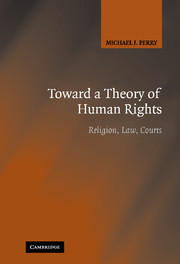PART ONE - THE MORALITY OF HUMAN RIGHTS
Published online by Cambridge University Press: 22 July 2009
Summary
According to Niklas Luhmann, the language of reverence has been discredited by the downfall of metaphysics. Logically taken further, that means that “the postulate that all human life is holy no longer exists.” The predominantly religious structures which provided the foundations of the concept of dignity, creatureliness and being in the image of God are no longer compellingly binding or even illuminating in the secular world.
Regina Ammicht-QuinnRichard Rorty, the leading postmodernist liberal theorist, … concedes that liberalism, once so jealous of its autonomy from Biblical faith, is in fact parasitic upon it. In his essay “Postmodern Bourgeois Liberalism,” he describes secular liberals like himself as “freeloading atheists.” They continue to rely on the Judeo-Christian legacy of concern with human dignity despite their rejection of the revealed truth that alone could support this concern. … For Rorty, God is dead but secularized Christian morality continues. This is precisely one of the scenarios envisaged by Nietzsche in The Gay Science: “God is dead, but given the way men are there may still be caves for thousands of years in which his shadow will be shown.” True, only 125 of those years have now passed, but on the evidence of Rorty's thought, it's hard to believe that this sort of shadow play still has centuries to run.
Clifford Orwin- Type
- Chapter
- Information
- Toward a Theory of Human RightsReligion, Law, Courts, pp. 1 - 2Publisher: Cambridge University PressPrint publication year: 2006



